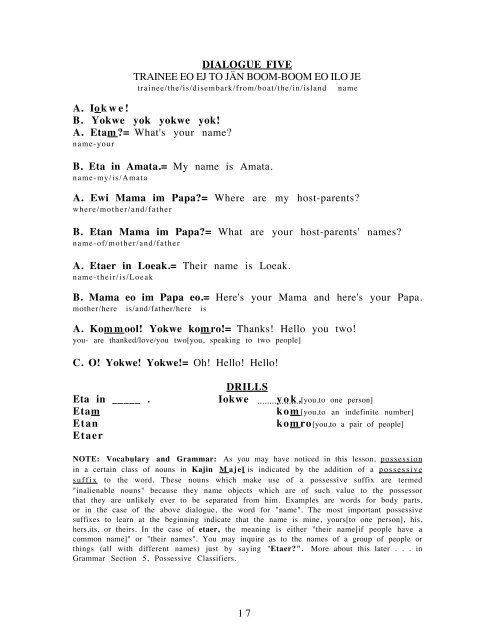Marshallese Language Training Manual - Linguistics
Marshallese Language Training Manual - Linguistics
Marshallese Language Training Manual - Linguistics
Create successful ePaper yourself
Turn your PDF publications into a flip-book with our unique Google optimized e-Paper software.
DIALOGUE FIVE<br />
TRAINEE EO EJ TO JÄN BOOM-BOOM EO ILO JE<br />
trainee/the/is/disembark/from/boat/the/in/island name<br />
A. Iokwe!<br />
B. Yokwe yok yokwe yok!<br />
A. Etam?= What's your name?<br />
name-your<br />
B. Eta in Amata.= My name is Amata.<br />
name-my/is/Amata<br />
A. Ewi Mama im Papa?= Where are my host-parents?<br />
where/mother/and/father<br />
B. Etan Mama im Papa?= What are your host-parents' names?<br />
name-of/mother/and/father<br />
A. Etaer in Loeak.= Their name is Loeak.<br />
name-their/is/Loeak<br />
B. Mama eo im Papa eo.= Here's your Mama and here's your Papa.<br />
mother/here is/and/father/here is<br />
A. Kommool! Yokwe komro!= Thanks! Hello you two!<br />
you- are thanked/love/you two[you, speaking to two people]<br />
C. O! Yokwe! Yokwe!= Oh! Hello! Hello!<br />
DRILLS<br />
Eta in _____ . Iokwe yok.[you,to one person]<br />
Etam kom [you,to an indefinite number]<br />
Etan komro[you,to a pair of people]<br />
Etaer<br />
NOTE: Vocabulary and Grammar: As you may have noticed in this lesson, possession<br />
in a certain class of nouns in Kajin M ajel is indicated by the addition of a possessive<br />
suffix to the word. These nouns which make use of a possessive suffix are termed<br />
"inalienable nouns" because they name objects which are of such value to the possessor<br />
that they are unlikely ever to be separated from him. Examples are words for body parts,<br />
or in the case of the above dialogue, the word for "name". The most important possessive<br />
suffixes to learn at the beginning indicate that the name is mine, yours[to one person], his,<br />
hers,its, or theirs. In the case of etaer, the meaning is either "their name[if people have a<br />
common name]" or "their names". You may inquire as to the names of a group of people or<br />
things (all with different names) just by saying "Etaer?". More about this later . . . in<br />
Grammar Section 5, Possessive Classifiers.<br />
17

















